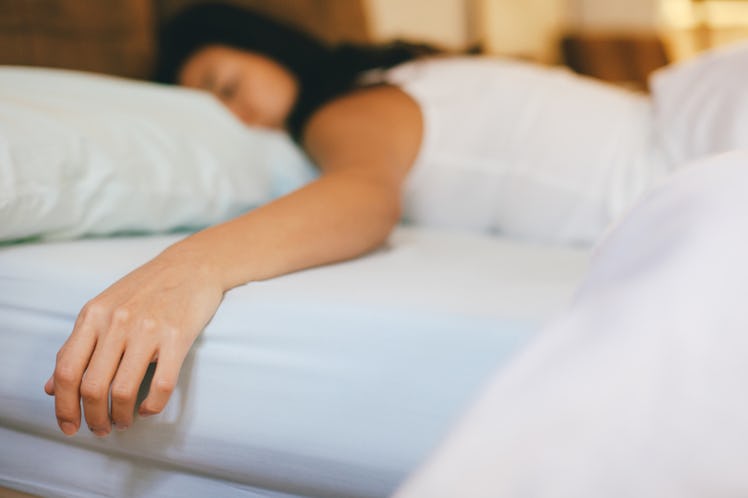
Sleeping In On The Weekend Won't Give You More Energy During The Week & Here's Why
If you're like me, you treat the weekend like some sort of hybrid between a carnival and a no-holds-barred, lifestyle free-for-all. You eat differently, you dress differently, and you treat sleep like you're trying to induce a coma. If you look at sleep as a cumulative effort, it might make sense to try to make up for your lost hours during the weekdays by sleeping for 15 hours two nights in a row on the weekends. Except, it might not work that way, which would lead you to wonder, is sleeping in on the weekends bad for you?
Well, yes and no. It's not necessarily unhealthy to sleep more on the weekend, but getting some extra sleep on Friday night certainly doesn't make up for your lost hours during the week.
Your sleep health is not the cumulative sum of hours you can accrue over any given period of time. Rather, you should think of the average amount of sleep you're getting as being more important than the overall sum: however much you're sleeping on average per night is a bigger indicator of your health than how many hours you slept in the last week.
If you're depriving yourself of sleep during the week with the intention of "making up for it" on the weekend, then yes, that's an unhealthy habit.
Here's how your sleep health works: Your body needs, on average, around seven or eight hours of sleep each night in order to keep your body up and running. Sleep isn't just about "feeling awake." While you're sleeping, your body works to repair muscular tissue, retain memories, and more.
When you sleep less than seven hours, you start to accrue something called sleep debt. According to the National Sleep Foundation, sleep debt is "the difference between the amount of sleep that you need and the amount that you’re actually getting." It can lead to drowsiness, lowered critical thinking skills, impaired driving ability, and more. Most of us have felt the effects of sleep debt at least once before.
To a certain extent, your body can make up for sleep deprivation. For example, if you spend a few nights cranking it out at work and only get six hours of sleep at night, you might end up sleeping nine or 10 hours on Friday for your body to naturally even itself out.
But when you start to treat sleep deprivation like something you can cash in on the weekends, that's when you have a problem.
Chronic sleep deprivation simply cannot be balanced out by the occasional 10-hour sleeping binge, according to a study by Harvard Medical School.
So if you usually get a good night's sleep, but have to pull an all-nighter one evening for an exam, then yes, it's easy to recalibrate your sleep healthily by getting a good night's rest the next day.
Maintaining good sleep health is all about cultivating long-term habits. Whatever you're doing on average is what matters, not the extremes in either direction.
If you're not sleeping enough most nights, don't panic.
The best thing you can do is think about what's keeping you from sleeping, and what small changes you can make to get more shut-eye, even if it's just 30 minutes extra per night.
For example, you might consider leaving your phone in another room and using a bedside alarm clock if you're known to spend time scrolling before bed. Or, if you're up late working as a student or a professional, it's worth considering how much you're really gaining during those late hours, and how much you could improve your performance by opting for sleep instead.
Of course, your sleep health is in constant flux, just like you are. Don't stress it so much. Rather, keep your eyes on the long-term prize. Next weekend, sleep in a few extra hours. If you're sleeping much longer than that, it might be time to reassess.